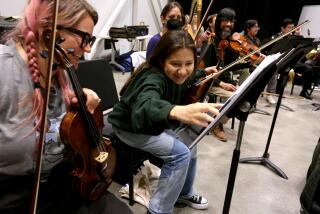Master and commander of Haydn
Haydn’s “Lord Nelson” Mass has been called the composer’s greatest single composition by none less than the famed Haydn authority H.C. Robbins Landon. So we were reminded in the UCLA Live program notes Saturday night. And so we were reminded in a great performance of it by John Eliot Gardner’s Monteverdi Choir and the Orchestre Revolutionnaire et Romantique in Royce Hall.
The piece, officially titled “Missa in Angustiis” (Mass for Anguished Times), was written during the Napoleonic wars, and its tone is one of triumph over adversity. It was premiered just as Nelson defeated the French at Aboukir.
It is forceful, militant music scored for thundering timpani, blazing trumpets and organ. An adamant, thrilling performance like this one is intended to make you feel the victor, proud and beaming and full of bursting emotion. Tears too.
Gardner is well known for his espousal of period instruments and performing practices. What that translated to in Royce Hall was an extremely punchy sound. The old, valveless trumpets pierce the air, to say nothing of the mellow gut-strung string instruments. The short, sharp attacks of historic timpani mimic old muskets. Sadly, there was no organ; sassy winds took its place. But the biggest impact of all came from the expressive singing.
The Monteverdi Choir is special for its flexibility and its ferociousness. Gardner is at his best in opera, and here he used his chorus for maximum dramatic impact. It was extraordinary just how much sound this small group of about 25 singers could produce in Haydn’s most aggressive passages. Egged on by those merciless trumpets and timpani thunderclaps, the chorus became the voice of the frigate in the heat of battle. But it was also extraordinary how tender a couple of dozen voices could sound beseeching God. If you want to know why music was so important to a certain master and commander, this is why.
Typical of Gardner, he used members of the chorus for the solo passages; also typical of Gardner, who has made several former choristers stars (Anne Sophie von Otter for one), he has a sensational new soprano to show off. Angharad Gruffydd Jones soared in coloratura passages and was exquisite in supple lyrical ones. Her voice is pure and brilliant. The fine alto was Margaret Cameron. Tenor Simon Wall and bass Michael Bundy fit in well enough.
For the first half of the program, Gardner led off with Handel’s Coronation Anthem No. 1 (“Zadok the Priest”), a joyful “Messiah”-like celebration of George II. Then came rare Mozart. The “Vesperae Solennes de Confessore” (Solemn Vespers of a Confessor) is still early, meant to be conservative church music written before Mozart moved to Vienna. But an impatient opera composer (the score is contemporary with “Idomeneo”) shows through in almost every bar, and Gardiner once more emphasized the score’s operatic qualities. There are some amazing choral passages, including a fugue that presages the Requiem Mozart wrote as he lay dying.
Gardner could be almost too hard-driven here, as if defending the work, bar by bar.
Still, there were beautiful moments, and none more so than Jones’ lovingly sung soprano solo “Laudate Dominum.” And the encore was more Mozart: a transcendent “Ave Verum Corpus.”
So winning a concert, however, deserved a bit more devotion from UCLA. It would have required little effort to include texts -- the Vespers have quite a bit. But the university no longer seems to prize the printed word for its classical offerings. It was surprising as well to see some empty seats. When Gardner performed Beethoven’s Ninth with his orchestra and chorus in the substantially larger Orange County Performing Arts Center five years ago, long lines of hopeful concertgoers were turned away.
More to Read
The biggest entertainment stories
Get our big stories about Hollywood, film, television, music, arts, culture and more right in your inbox as soon as they publish.
You may occasionally receive promotional content from the Los Angeles Times.











